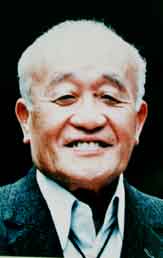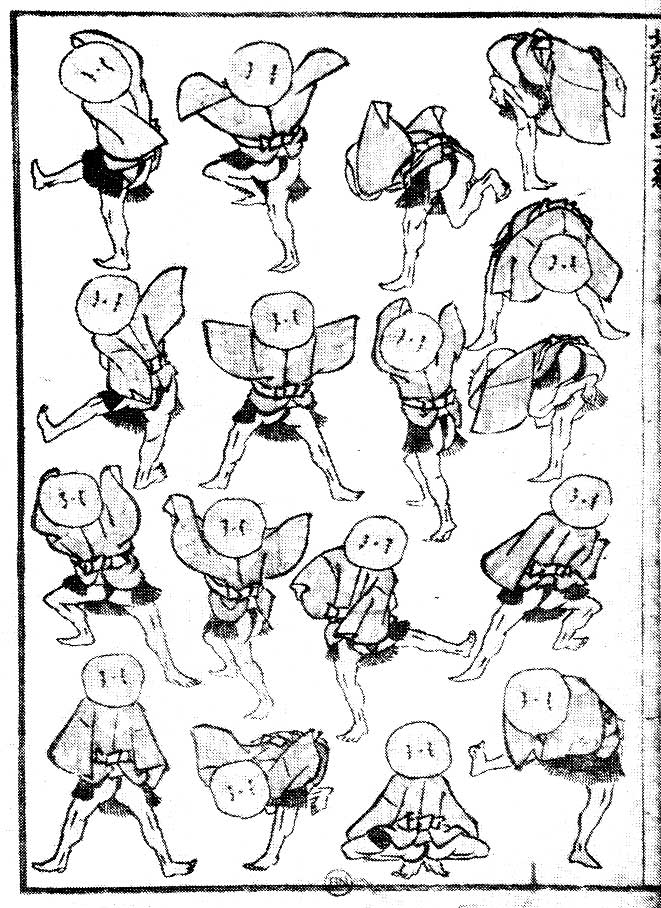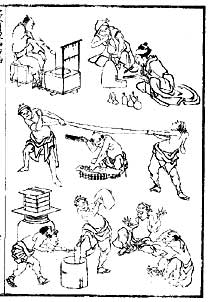

Tadashi FUKUDA
(1910-1986)
by Pierre-Marie GAGEY
 |
|||||
 |
|||||
|
Tadashi FUKUDA (1910-1986) |
|||||
Tadashi FUKUDA's myth preceded the person, so much his pupils and the pupils of his pupils repeated his history. He was the Student of the Kyoto imperial University, the ENT resident, who had taken up the challenge to clinically interpret the book of R. MAGNUS and who, by winning, had marked with the seal of the Japanese thought the practice of the international medicine. His boss of thesis, Teiji HOSHINO, had brought back a Körperstellung's copy from his stay in Europe but he had had no time to read it, only to go quickly through, peeping at its numerous illustrations of animals, caught in many sorts of postures, that gave him the idea — funny — proposing to FUKUDA to make his thesis on the postures of the judokas in the light of the works of MAGNUS and HIRSCH. So began the mythical history of our hero. During hours and hours in the library of the Faculty, he suffered reading, reading again and re - reading again MAGNUS.'s book without understanding anything. First, this book was written in German. Then FUKUDA, bad pupil in anatomy, had to resume completely his studies of the central nervous system. Finally, and especially, nobody proposed him a method to study the posture. To go on in this incognizance domain, FUKUDA, then, got rid of all medical traditional, western way of thinking. He goes out of the library, walks in streets and, such a new HOKUSAI (fig.1), observes children games to catch their postural dynamics — him too —, and to understand why they have some relationship with MAGNUS's drawings, as Koichi NISHIHATA made him notice.
And… in the early hours of a sunny winter day, in the warm library of all its confusions, panes of which were covered with reek — as he reported— suddenly FUKUDA imagines the test which is going to free everything, the "blindfolded writing test ". «For the first time, he wrote, I had found the wings which allowed me to fly by myself; one after the other, they opened the doors of the mystery in front of which I had to remain for such a long time, desperately blocked.» That's the way he discovers "both phases of the labyrinthique reflex". Beside reflex reactions to the strong stimulations used by ENT — irrigations of the ear with warm or ice-cold water, rotations on armchair — ending in the counting of nystagmic beats, it is possible to simply observe, without the slightest stimulation, the tonic answers of members to the current state of the inner ear (we would say of the postural system, today).
FUKUDA writes that in his thesis, "Studies one dynamic postures", which he defends in 1944 (one year before Hiroshima about which he never ever spoke to me). And in 1957, in his book, "Statokinetic reflexes in Equilibrium and Movement", he starts again defending and developping these ideas. But then, he is conscious of being at the origin of a revolution in the medical thought. «In the other countries, the thought of doctors is trapped inside the frames of BARANY's ENT theories.» he writes. So he considers himself as a liberating spirit at an international level. Surprising!
All the more amazing that the person has nothing to do with an intellectual. He defines himself as an Epicurean, following LIN YU-T'ANG whose works he met in China, while he made war! FUKUDA had decided to study medicine in order to gain a great deal of money for being able to enjoy the life completely, and absolutely not in order to look for the truth in Medicine!. He enjoyed life so much, he took so much advantage of it that he was not able to refrain from publishing a book to tell us all his small happiness. One sees him photographed with his wife — Kanai! As he called her roughly (a big lady!.) — His children, and grandchildren, a salmon he has just fished in the sea, or digging his garden a beret on his head. The beret… because he enjoyed very much being in Paris and in France. From all his worldwide travels, the only photo which he publishes is taken in the "Palais Royal" gardens of Paris. And he liked the long thin loaf of French bread, the sausage and above all the Burgundy wine of which he refiled himself his glass without waiting that one notices it was empty.
Life is fragile, as evanescent as the reek on the panes of the library of the Kyoto's imperial university!. But happiness, as beauty, has no relation with time, we have to catch it when it passes and to take advantage of it. This philosophy which FUKUDA attributes to LIN YU-T'ANG, is not without any relationship to "the way of the weakness" — that to say the "Judo — did not prevent FUKUDA from strongly willing to understand, and even less from savouring his mythical success
 |
 |
||
FIG.1 - Katsushika HOKUSAI (1760-1849) Exercise book of sketch
References
Fukuda T. (1961) Studies on human dynamic postures from the viewpoint of postural reflexes. Acta Otolaryngol. (Stockh.) Supp. 161.
Fukuda T. (1981) Statokinetic Reflexes in Equilibrium and Movement. University of Tokyo Press (Tokyo)
Hirsch C. (1940) A new labyrinthine reaction. The waltzing test. Ann. Otol. (St Louis), 49, 232-236.
Magnus R. (1924) Körperstellung. Springer (Berlin).